Chapter 3: Wage
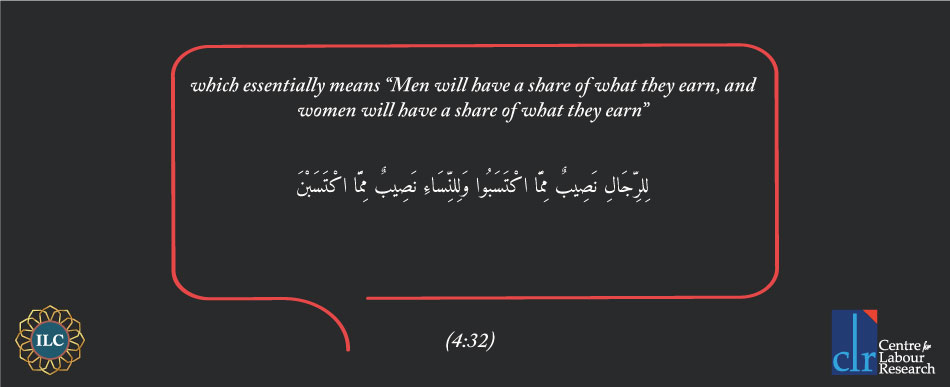
- An employer shall pay the wages/salaries to the workers without any discrimination.[1]
- Wages shall be set in accordance with the prevalent market standard for a similarly situated occupation and comply with all prevailing laws and regulations.
- Minimum Wages shall be determined[2] through Minimum Wage Council in such a manner that these satisfy the basic needs of workers concerning food, shelter, clothing, health, education and transport.[3]
- Basic needs shall be defined in line with the international standards and particular country situation, keeping in view the cost of living in a country.[4]
- Employment contracts shall clearly specify wages provided that such wages shall not be less than the minimum wages determined by the Minimum Wage Council.[5]
- Payment of wages/salaries shall be made during working hours of working days directly to the bank account advised in writing by the worker to employer.[6]
- Wages shall be paid on an hourly, daily, weekly, fortnightly or monthly basis. The maximum wage payment period shall not exceed one month.[7]
- Notwithstanding the principle of equal pay for work of equal value, the Minimum Wage Council may recommend different minimum wages/salaries for different occupations or special categories of workers.[8]
- An employer shall pay the net wages due to the worker.[9] Notwithstanding the above requirement, certain deductions, to be determined under the Rules, shall be allowed.[10]
- An employer shall provide worker, with each payment of wages/salaries, with a written pay statement in writing in form and language that the worker understands.[11]
- An employer who fails to pay a worker in accordance with the minimum wage as adjusted, fixed and published under this Code, commits an offence.[12]
[1] The Quran distinctly refers to the treatment of men and women. It does not differentiate between the deeds of men and women and their rewards. Its emphatic declaration is
لِلرِّجَالِ نَصِيبٌ مِمَّا اكْتَسَبُوا وَلِلنِّسَاءِ نَصِيبٌ مِمَّا اكْتَسَبْنَ
which essentially means “Men will have a share of what they earn, and women will have a share of what they earn”. (4:32)
The Quran also refers to the issue of wage payment and excessive deductions. It requires equal wages for work of equal value, without any discrimination.
“Always fill up the full measure and do not become injurious (to the rights of the people). And weigh with a straight balance. And do not give to the people their things (weighing) less than what is due, nor provoke strife in the land (by such moral, economic and social corruption and fraud)”. (26:181-183)
أَوْفُوا الْكَيْلَ وَلَا تَكُونُوا مِنَ الْمُخْسِرِينَوَزِنُوا بِالْقِسْطَاسِ الْمُسْتَقِيمِوَلَا تَبْخَسُوا النَّاسَ أَشْيَاءَهُمْ وَلَا تَعْثَوْا فِي الْأَرْضِ مُفْسِدِينَ
In the following long verse, the Quran once again clarifies that the reward for good deeds is equal for everyone, irrespective of their gender: “Surely, the submissive men and the submissive women, and the believing men and the believing women, and the obedient men and the obedient women, and the truthful men and the truthful women, and the steadfast men and the steadfast women, and the humble men and the humble women, and the men who give alms and the women who give alms, and the men who fast and the women who fast, and the men who guard their chastity and the women who guard their chastity, and the men who remember Allah abundantly and the women who remember Allah very much—Allah has prepared for all of them forgiveness and a mighty reward”. (33:35)
إِنَّ الْمُسْلِمِينَ وَالْمُسْلِمَاتِ وَالْمُؤْمِنِينَ وَالْمُؤْمِنَاتِ وَالْقَانِتِينَ وَالْقَانِتَاتِ وَالصَّادِقِينَ وَالصَّادِقَاتِ وَالصَّابِرِينَ وَالصَّابِرَاتِ وَالْخَاشِعِينَ وَالْخَاشِعَاتِ وَالْمُتَصَدِّقِينَ وَالْمُتَصَدِّقَاتِ وَالصَّائِمِينَ وَالصَّائِمَاتِ وَالْحَافِظِينَ فُرُوجَهُمْ وَالْحَافِظَاتِ وَالذَّاكِرِينَ اللَّهَ كَثِيرًا وَالذَّاكِرَاتِ أَعَدَّ اللَّهُ لَهُمْ مَغْفِرَةً وَأَجْرًا عَظِيمًا
While this verse prohibits discrimination in wages on any discriminatory grounds, it still allows wage differentials on the grounds of skills, qualifications and experience. “And that man (according to justice) will get only that for which he strives. (As for bounty, no one has any right to it. That is merely Allah’s bestowal and pleasure, granting as much as He wills to whom He pleases.)”. (53:39)
وَاَنْ لَّيْسَ لِلْاِنْسَانِ اِلَّا مَا سَعٰى
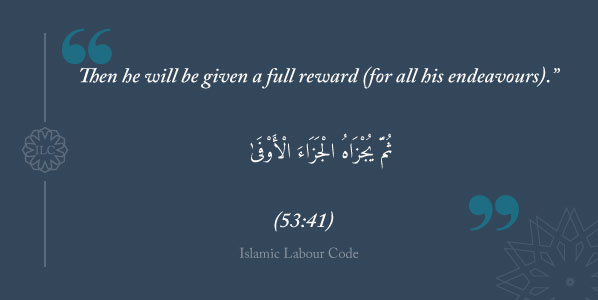
The same argument is made here: “Then he will be given a full reward (for all his endeavours)”. (53:41)
ثُمَّ يُجْزَاهُ الْجَزَاءَ الْأَوْفَىٰ
The basis for higher wages should be skills, qualifications and performance. Wage premiums are allowed under this verse of the Holy Quran.
وَمَا أَمْوَالُكُمْ وَلَا أَوْلَادُكُم بِالَّتِي تُقَرِّبُكُمْ عِندَنَا زُلْفَىٰ إِلَّا مَنْ آمَنَ وَعَمِلَ صَالِحًا فَأُولَٰئِكَ لَهُمْ جَزَاءُ الضِّعْفِ بِمَا عَمِلُوا وَهُمْ فِي الْغُرُفَاتِ آمِنُونَ
“And it is not your wealth or your children that can bring you nearness and intimacy in Our presence. But whoever believes and does good works, it is they for whom the reward is twofold for their works. And they will live in peace in lofty mansions (of Paradise)”. (34:37)
Wage differentials based on skills, qualification, arduousness in work and hazardous working conditions are allowed. Similarly, higher wages may be paid for working the unsocial hours, i.e., night shift, weekends, or public holidays. Hard area allowance may also fall under that.
Allah’s Messenger (ﷺ) said, “Your period (i.e., the Muslims’ period) in comparison to the periods of the previous nations, is like the period between the `Asr prayer and sunset. And your example in comparison to the Jews and the Christians is like the example of a person who employed some labourers and asked them, ‘Who will work for me till midday for one Qirat each?’ The Jews worked for half a day for one Qirat each. The person asked, ‘Who will do the work for me from midday to the time of the `Asr (prayer) for one Qirat each?’ The Christians worked from midday till the `Asr prayer for one Qirat. Then the person asked, ‘Who will do the work for me from the `Asr till sunset for two Qirats each?’ “The Prophet (ﷺ) added, “It is you (i.e., Muslims) who are doing the work from the Asr till sunset, so you will have a double reward. The Jews and the Christians got angry and said, ‘We have done more work but got fewer wages.’ Allah said, ‘Have I been unjust to you as regards your rights?’ They said, ‘No.’ So, Allah said, ‘Then it is My Blessing which I bestow on whomever I like. (Bukhari: 3459)
إِنَّمَا أَجَلُكُمْ فِي أَجَلِ مَنْ خَلاَ مِنَ الأُمَمِ مَا بَيْنَ صَلاَةِ الْعَصْرِ إِلَى مَغْرِبِ الشَّمْسِ، وَإِنَّمَا مَثَلُكُمْ وَمَثَلُ الْيَهُودِ وَالنَّصَارَى كَرَجُلٍ اسْتَعْمَلَ عُمَّالاً فَقَالَ مَنْ يَعْمَلُ لِي إِلَى نِصْفِ النَّهَارِ عَلَى قِيرَاطٍ قِيرَاطٍ فَعَمِلَتِ الْيَهُودُ إِلَى نِصْفِ النَّهَارِ عَلَى قِيرَاطٍ قِيرَاطٍ، ثُمَّ قَالَ مَنْ يَعْمَلُ لِي مِنْ نِصْفِ النَّهَارِ إِلَى صَلاَةِ الْعَصْرِ عَلَى قِيرَاطٍ قِيرَاطٍ فَعَمِلَتِ النَّصَارَى مِنْ نِصْفِ النَّهَارِ إِلَى صَلاَةِ الْعَصْرِ، عَلَى قِيرَاطٍ قِيرَاطٍ، ثُمَّ قَالَ مَنْ يَعْمَلُ لِي مِنْ صَلاَةِ الْعَصْرِ إِلَى مَغْرِبِ الشَّمْسِ عَلَى قِيرَاطَيْنِ قِيرَاطَيْنِ أَلاَ فَأَنْتُمُ الَّذِينَ يَعْمَلُونَ مِنْ صَلاَةِ الْعَصْرِ إِلَى مَغْرِبِ الشَّمْسِ عَلَى قِيرَاطَيْنِ قِيرَاطَيْنِ، أَلاَ لَكُمُ الأَجْرُ مَرَّتَيْنِ، فَغَضِبَتِ الْيَهُودُ وَالنَّصَارَى، فَقَالُوا نَحْنُ أَكْثَرُ عَمَلاً وَأَقَلُّ عَطَاءً، قَالَ اللَّهُ هَلْ ظَلَمْتُكُمْ مِنْ حَقِّكُمْ شَيْئًا قَالُوا لاَ. قَالَ فَإِنَّهُ فَضْلِي أُعْطِيهِ مَنْ شِئْتُ
Wage differentials, when based on seniority or performance, are also allowed. Hence, the difference in annual stipend, as ordered by Caliph Umar (RA). “The Badr warriors were given five thousand (Dirhams) each, yearly. `Umar said, “I will surely give them more than what I will give to others”. (Bukhari: 4022) Salama bin al-Akwa relates that he was given two shares from war booty (in the Battle of Du Qarad) due to his exceptional performance and the Prophet (ﷺ) announcing him as the best footman (Muslim:1807)
Wage differentials are again allowed based on hardship, seniority and family responsibilities. There are various criteria that might be considered while setting the minimum wages. “Malik ibn Aws ibn al-Hadthan said: One day Umar ibn al-Khattab (RA) mentioned the spoils of war and said: I am not more entitled to this spoil of war than you; and none of us is more entitled to it than another, except that we occupy our positions fixed by the Book of Allah, Who is Great and Glorious, and the division made by the Messenger of Allah (ﷺ), people being arranged according to their precedence in accepting Islam, the hardship they have endured their having children and their need”. (Sunan Abu Daud: 2950)
ذَكَرَ عُمَرُ بْنُ الْخَطَّابِ يَوْمًا الْفَىْءَ فَقَالَ مَا أَنَا بِأَحَقَّ، بِهَذَا الْفَىْءِ مِنْكُمْ وَمَا أَحَدٌ مِنَّا بِأَحَقَّ بِهِ مِنْ أَحَدٍ إِلاَّ أَنَّا عَلَى مَنَازِلِنَا مِنْ كِتَابِ اللَّهِ عَزَّ وَجَلَّ وَقَسْمِ رَسُولِ اللَّهِ صلى الله عليه وسلم فَالرَّجُلُ وَقِدَمُهُ وَالرَّجُلُ وَبَلاَؤُهُ وَالرَّجُلُ وَعِيَالُهُ وَالرَّجُلُ وَحَاجَتُهُ
There is, however, another view by Caliph Abu Bakar (RA) where he preferred equality in stipends rather than giving more to the companions of the Prophet (ﷺ) based on their acceptance of Islam. (See Fiqh Abu Bakar by Mohammad Rawas Qalaji, p 25)
The Quran also notes that some would be rewarded in double on the Day of Judgment: “But for those who of their Sustainer’s Presence stand in fear, two gardens (of paradise are readied)”. (55:46)
وَلِمَنْ خَافَ مَقَامَ رَبِّهِ جَنَّتَانِ
In another instance, the Quran also refers to the idea of paying more than what is due: “And for this their belief God will reward them with gardens through which running waters flow, therein to abide: for such is the requital of the doers of good”. (05:85)
فَأَثَابَهُمُ اللَّهُ بِمَا قَالُوا جَنَّاتٍ تَجْرِي مِنْ تَحْتِهَا الْأَنْهَارُ خَالِدِينَ فِيهَا وَذَلِكَ جَزَاءُ الْمُحْسِنِينَ
The State cannot discriminate between men and women or between masses on the grounds of gender, religion, race, caste, or creed, etc. This event indicates a prohibition of racial discrimination in wage payment. “Imam Ali, when he equally gave money and food to two women, one of whom was an Arab and the other a slave, one of them protested, saying, ‘I am an Arab woman, and she is a non-Arab.’ He said, ‘By Allah, I do not see in the children of Ismail (AS) in this shade any merit over the children of Ishaq (AS)”. (Sharh Nahj al-Balagha li Ibn Abi al-Hadid, v. 2, p. 200, no. 201)
[2] “Prices became excessive during the time of the Messenger of Allah (ﷺ), so they said: ‘O Messenger of Allah! Set prices for us! So, he said: ‘Indeed Allah is Al-Musa’ir, Al-Qabid, Al-Basir, Ar-Razzaq. And I am hopeful that I meet my Lord and none of you is seeking (recompense from) me for an injustice involving blood or wealth”. (Jami` at-Tirmidhi: 1314)
The people said: Messenger of Allah, prices have shot up, so fix prices for us. Thereupon the Messenger of Allah (ﷺ) said: Allah is the one Who fixes prices, Who withholds, gives lavishly and provides, and I hope that when I meet Allah, none of you will have any claim on me for an injustice regarding blood or property. (Sunan Abi Dawud: 3451)
قَالَ النَّاسُ يَا رَسُولَ اللَّهِ غَلاَ السِّعْرُ فَسَعِّرْ لَنَا . فَقَالَ رَسُولُ اللَّهِ صلى الله عليه وسلم إِنَّ اللَّهَ هُوَ الْمُسَعِّرُ الْقَابِضُ الْبَاسِطُ الرَّازِقُ وَإِنِّي لأَرْجُو أَنْ أَلْقَى اللَّهَ وَلَيْسَ أَحَدٌ مِنْكُمْ يُطَالِبُنِي بِمَظْلَمَةٍ فِي دَمٍ وَلاَ مَالٍ
This is the most crucial hadith that is quoted by those who are against price-fixing by state. As a general rule, Islam does not allow market intervention by the Government in price or wage fixation. However, if market imperfections are causing erosion of workers’ wages and equilibrium in the market is set at a very low level, the state can require employers to provide Ujra mithl (intrinsic wage or wage accepted by others for similar work) to the workers—a form of what is now often called “prevailing wage”.
Ibn Taimiyyah (d. 1328) argues that there are specific industries like farming, building, weaving, and other public utilities that are not supported by the market forces (due to market distortions), and individuals also do not invest in these activities. However, if the public needs those industries, they become a collective obligation (fard kifaya) where some individuals have to do these works.
He is of the view that individuals should voluntarily take those occupations since these are necessary for a society. Still, the office of market inspection can force people to adopt these occupations after setting a minimum wage for them so that workers are not exploited at the hands of employers. He considers that in such a case involving the provision of public utilities, Government must fix a fair rate of remuneration for workers. In addition to the issue of collective/public goods, minimum wage fixation is also supported in the other sectors of the economy.
[3] The forthcoming hadith provides the basis for living wages. Instead of poverty and slavery wages, the employer should ensure that workers’ basic needs are met through wages. Same principles apply while the government sets minimum wages.
لِلْمَمْلُوكِ طَعَامُهُ وَكِسْوَتُهُ، وَلَا يُكَلَّفُ مِنَ الْعَمَلِ إِلَّا مَا يُطِيقُ
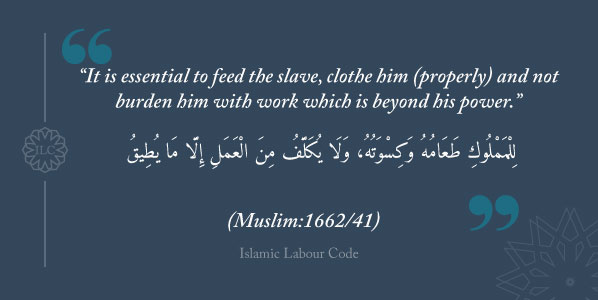
“It is essential to feed the slave, clothe him (properly) and not burden him with work which is beyond his power”. (Muslim:1662/41)
Al-Mustawrid heard the Prophet (ﷺ) say: He who acts as a worker for us must get married and have a wife; if he has not a servant, he must get one, and if he has not a dwelling, he must get one. He said that Abu Bakr reported: I was told that the Prophet (ﷺ) said: He who takes anything else he is unfaithful or thief.
(Sunan Abi Dawud: 2945)
من كانَ لنا عاملًا فليَكتسب زوجةً فإن لم يَكن لَهُ خادمٌ فليَكتسِبْ خادمًا فإن لم يَكن لَهُ مسْكنٌ فليَكتسب مَسْكنًا قالَ قالَ أبو بَكرٍ أُخبِرتُ أنَّ النَّبيَّ صلَّى اللَّهُ عليْهِ وسلَّمَ قالَ منِ اتَّخذَ غيرَ ذلِكَ فَهوَ غالٌّ أو سارِقٌ
While setting the minimum wages (living wages), workers’ family responsibilities might be taken into account. Higher wages or benefits for those with families than those who are single, as prescribed in this hadithhadith. “Narrated ‘Awf bin Malik: When the spoils (fai’) came to the Messenger of Allah (ﷺ), he divided it that day; he gave two portions to a married man and one to a bachelor. The narrator Ibn al-Musaffa added: We were summoned, and I would be summoned before ‘Ammar. So, I was summoned, and he gave me two portions, for I had a family; then ‘Ammar b. Yasir was summoned after me and given one”. (Sunan Abi Dawud: 2953)
Fulfilling the basic needs of workers should be one of the preferred forms of Sadaqa. “The Prophet (ﷺ) commanded to give sadaqah. A man said: Messenger of Allah, I have a dinar. He said: Spend it on yourself. He again said: I have another. He said: Spend it on your children. He again said: I have another. He said: Spend it on your wife. He again said: I have another. He said: Spend it on your servant. He finally said: I have another. He replied: “You know best (what to do with it)”. (Sunan Abi Dawud: 1691)
[4] While minimum wage laws need to be respected, a general rule is that wage rates depend on the financial condition of the employer. This is especially relevant to the minimum wages and other benefits determined through collective bargaining.
لَّا جُنَاحَ عَلَيْكُمْ إِن طَلَّقْتُمُ النِّسَاءَ مَا لَمْ تَمَسُّوهُنَّ أَوْ تَفْرِضُوا لَهُنَّ فَرِيضَةً ۚ وَمَتِّعُوهُنَّ عَلَى الْمُوسِعِ قَدَرُهُ وَعَلَى الْمُقْتِرِ قَدَرُهُ مَتَاعًا بِالْمَعْرُوفِ ۖ حَقًّا عَلَى الْمُحْسِنِينَ
“There will (also) be no sin on you if you divorce (the wedlocked) women even before touching them or fixing their dower. Then (in this case) provide for them appropriately. It is (an obligation) for the rich according to his means and for the poor according to his means. (In any case) this provision must be made in a becoming manner. This is compulsory for the pious”. (02:236)
While fixing wages, the employer’s financial condition must also be considered. This also implies that employer representatives must be consulted while fixing wages.
وَلَا تَجْعَلْ يَدَكَ مَغْلُولَةً إِلَى عُنُقِكَ وَلَا تَبْسُطْهَا كُلَّ الْبَسْطِ فَتَقْعُدَ مَلُومًا مَحْسُورًا
“And neither keep your hand-tied to your neck (giving nothing to anyone) nor stretch it wide open (giving away all) lest you should sit back, blamed (and) consumed”. (17:29)
[5] Wages must be specified in the employment contract. Minimum wage notification by Government also serves the same purpose. In the verse below, “camel load” is a specific remuneration which is given on completion of a task. This verse also refers to the concept of bonus and performance pay.
قَالُوا نَفْقِدُ صُوَاعَ الْمَلِكِ وَلِمَن جَاءَ بِهِ حِمْلُ بَعِيرٍ وَأَنَا بِهِ زَعِيمٌ
“They (the servants of the king’s court) said: ‘We are missing the royal goblet, and the man who brings it (after searching) will get a camel’s load of grain as a reward and I pledge myself for it”. (12:72)
The Prophet (ﷺ) specified that “Whoever employs someone to work for him, he must specify for such worker his wage in advance”. (Musannaf Abdur Razzaq, hadith No. 15023)
The Prophet (ﷺ) disliked a situation where a worker is made to work without specifying wages. He ordained to inform the worker about wages before initiation of work (Musannaf ibn Abi Shaiba, hadith No. 21516)
أنَّ رسولَ اللهِ صلَّى اللهُ عليهِ وسلَّمَ نَهَى عن استئجارِ الأجيرِ حتى يُبَيَّنَ لهُ أجرُهُ
عن النبي صلَّى اللهُ عليه وسلَّمَ أنه نهى أن يستأجر الأجير حتى يعلم أجره
Workers’ right to a living wage is a first. In the event of insolvency, workers’ wages (like debt) must be paid first. The Prophet (ﷺ) said, ‘The real miser is the one who refuses to pay the mandatory alms-tax from his wealth and refuses to spend on the necessities of his people, yet he squanders it on other things.’ [Maani al-Akhbar, p. 245, no. 4]
Similarly, even in the event of insolvency or closure of establishment/enterprise, workers’ right to wages is protected. And the employer must act generously. An agreement can be signed between the employer and the trade union to protect workers’ right while considering the employers’ financial condition. Some basic guideline can also be provided under the rules.
The Quran says the following: “And never forget extending generosity (and behaving excellently) towards each other (even in these moments of stress and strain)”. (02:237)
وَ لَا تَنْسَوُا الْفَضْلَ بَیْنَكُمْؕ
The Prophetic guidance زِنْ وَأَرْجِحْ (weigh properly and weigh it swinging in favour of the buyer) is not only applicable to those who are selling a product but also for the employers who should be willing to pay wages higher than the minimum wages set by the government. The wages set by the government are only a floor and should not be treated as the maximum. (Tabrani:, Al Mojam al Awsaṭ: 6954)
A similar hadith is in Abi Dawud and Ibn Majah: Suwayd ibn Qays (RA) narrated the following: “I and Makhrafah al-Abdi imported some garments from Hajar, and brought them to Mecca. The Messenger of Allah (ﷺ) came to us walking, and after he had bargained with us for some trousers, we sold them to him. There was a man who was weighing for payment. The Messenger of Allah (ﷺ) said to him: Weigh out and give overweight”. (Abi Dawud: 3336)
حَدَّثَنِي سُوَيْدُ بْنُ قَيْسٍ، قَالَ جَلَبْتُ أَنَا وَمَخْرَمَةُ الْعَبْدِيُّ، بَزًّا مِنْ هَجَرَ فَأَتَيْنَا بِهِ مَكَّةَ فَجَاءَنَا رَسُولُ اللَّهِ صلى الله عليه وسلم يَمْشِي فَسَاوَمَنَا بِسَرَاوِيلَ فَبِعْنَاهُ وَثَمَّ رَجُلٌ يَزِنُ بِالأَجْرِ فَقَالَ لَهُ رَسُولُ اللَّهِ صلى الله عليه وسلم “ زِنْ وَأَرْجِحْ
Malik Abu Safwan bin ‘Umairah, said: “I bought a pair of trousers from the Messenger of Allah (ﷺ) before the Hijrah, (while paying for it) he weighed it for me and allowed more”. (Ibn Majah: 2221)
أَبَا صَفْوَانَ بْنَ عُمَيْرَةَ، قَالَ بِعْتُ مِنْ رَسُولِ اللَّهِ ـ صلى الله عليه وسلم ـ رِجْلَ سَرَاوِيلَ قَبْلَ الْهِجْرَةِ فَوَزَنَ لِي فَأَرْجَحَ لِي .
[6] Employers are required to pay full wages to workers on time. The verses also impose a responsibility on workers to do their work with total commitment and should not shirk from work.
وَإِلَىٰ مَدْيَنَ أَخَاهُمْ شُعَيْبًا ۗ قَالَ يَا قَوْمِ اعْبُدُوا اللَّهَ مَا لَكُم مِّنْ إِلَٰهٍ غَيْرُهُ ۖ قَدْ جَاءَتْكُم بَيِّنَةٌ مِّن رَّبِّكُمْ ۖ فَأَوْفُوا الْكَيْلَ وَالْمِيزَانَ وَلَا تَبْخَسُوا النَّاسَ أَشْيَاءَهُمْ وَلَا تُفْسِدُوا فِي الْأَرْضِ بَعْدَ إِصْلَاحِهَا ۚ ذَٰلِكُمْ خَيْرٌ لَّكُمْ إِن كُنتُم مُّؤْمِنِينَ
“And towards Madyan (We sent) their (kinship) brother Shuaib (AS). He said: ‘O my people, always worship Allah; you have no God except He. Indeed, there has come to you from your Lord a clear sign. So, give full measure and weight, and do not decrease whilst giving people their things, nor create mischief in the land after reformation (of the living conditions). This is better for you if you believe (in the divine message)”. (07:85)
Employers are bound to pay wages at a prescribed time and manner. Any delay in wage payment is considered injustice and violation on the part of the employer. “The Prophet (ﷺ) said, “A wealthy man’s postponement [in repayment of a debt] is oppression”. (Mustadrak al-Wasail, v. 13, p. 397, no. 15713: Bukhari: 2287)
مَطْلُ الغَنِيِّ ظُلْم
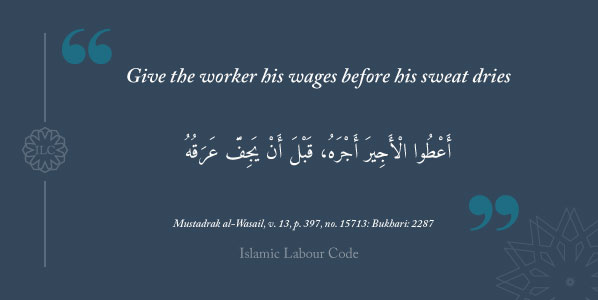
Wages are like debt on the part of the employer. The principle has been set in this hadith. The best employers are those who do not withhold wages or delay payment of wages. It is described in hadith that the Prophet (ﷺ) would never withhold the wages of any person (وَلَمْ يَكُنْ يَظْلِمُ أَحَدًا أَجْرَه) (Bukhari: 2280)
The Prophet (ﷺ) said, “The best of earnings is the earning of traders who when they speak, they do not lie, when they are entrusted with something they do not betray, when they promise they do not breach when they buy they do not defame [the goods], when they sell they do not praise [their own goods], when they are in debt they do not delay its repayment, and if they are owed [money] they do not force [their debtor]”. (Kanz al-`Ummal, hadith No. 9340-9341)
Withholding wages or delay payment of wages is injustice and a violation of the law. It is a punishable offence. “(Wrongdoing) is when a rich man takes a long time to repay a debt, and if one of you is referred to a rich man (to collect a debt), he should accept that referral”. (Mishkat al-Masabih: 2907)
مَطْلُ الْغَنِيِّ ظُلْمٌ فَإِذَا أُتْبِعَ أحدكُم على مَلِيء فَليتبعْ
Withholding of wages or wage theft is prohibited in another hadith in the following words: “This sin is enough for a man that he withholds the subsistence from one whose master he is”. (Sahih Muslim: 996)
كَفَى بِالْمَرْءِ إِثْمًا أَنْ يَحْبِسَ عَمَّنْ يَمْلِكُ قُوتَهُ
[7] Quran refers to the issue of timely payment of wages in this verse: “Surely, Allah commands you to render the trusts to those who are worthy of them;”. (04:58)
إِنَّ اللَّـهَ يَأْمُرُكُمْ أَن تُؤَدُّوا الْأَمَانَاتِ إِلَىٰ أَهْلِهَا
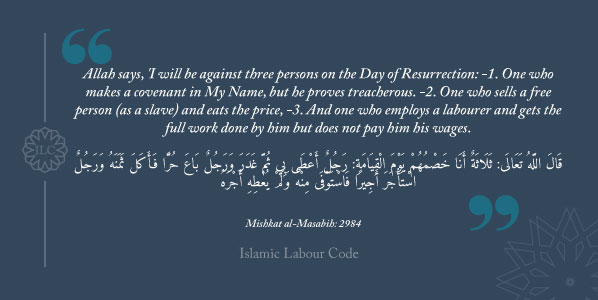
Regular payment of wages is specified under this hadith. The wage payment period can be agreed between the worker and employer; however, it cannot exceed one month. “It was narrated from ‘Abdullah bin ‘Umar that the Messenger of Allah (ﷺ) said: “Give the worker his wages before his sweat dries”. (Mishkat al-Masabih: 2987)
أَعْطُوا الْأَجِيرَ أَجْرَهُ، قَبْلَ أَنْ يَجِفَّ عَرَقُهُ
Withholding of wages or delay in payment of wages is an offence which can lead to fines as well as imprisonment. “Ash-Sharid reported Allah’s Messenger as saying, “Delay in payment on the part of one who possesses the means makes its lawful to dishonour and punish him”. Ibn al-Mubarak said that “dishonour” means he may be addressed roughly and “punish” suggests he may be imprisoned for it”. (Sunan Abi Dawud: 3628)
لَىُّ الْوَاجِدِ يُحِلُّ عِرْضَهُ وَعُقُوبَتَهُ
Workers must be paid wages on completion of work. The maximum wage period, however, cannot exceed one month. “The Prophet (ﷺ) said, “No, but a workman is paid his full wages only when has finished his work”. (Mishkat al-Masabih: 1968)
وَلَكِنَّ الْعَامِلَ إِنَّمَا يُوَفَّى أجره إِذا قضى عمل
[8] Payment of wages should take into account the custom of the place as well as the cost of living. An employer cannot be required to pay more than what is customary unless agreed between the parties. Here are a couple of examples from the Quran which can be used in employment relationships. These verses are related to family relationships.
“And the mothers shall suckle their infants for two full years. This (injunction) is for him who wants to complete the suckling period. And, according to usage, the food and clothing of the feeding mothers is the obligation of the father of the child. No soul should be stressed beyond its capacity, (and) neither the mother nor the father should be harmed for the child. The same injunction applies to the heirs. Then if both the mother and the father desire with mutual consultation and consent to wean (even before the fixed two years), there will be no sin on them. Nor shall it be a sin if you intend to engage (wet nurses) for suckling the children, whilst you pay them whatever you do according to usage. And fear Allah and know that Allah is Watchful of all that you do”. (02:233)
وَالْوَالِدَاتُ يُرْضِعْنَ أَوْلَادَهُنَّ حَوْلَيْنِ كَامِلَيْنِ ۖ لِمَنْ أَرَادَ أَن يُتِمَّ الرَّضَاعَةَ ۚ وَعَلَى الْمَوْلُودِ لَهُ رِزْقُهُنَّ وَكِسْوَتُهُنَّ بِالْمَعْرُوفِ ۚ لَا تُكَلَّفُ نَفْسٌ إِلَّا وُسْعَهَا ۚ لَا تُضَارَّ وَالِدَةٌ بِوَلَدِهَا وَلَا مَوْلُودٌ لَّهُ بِوَلَدِهِ ۚ وَعَلَى الْوَارِثِ مِثْلُ ذَٰلِكَ ۗ فَإِنْ أَرَادَا فِصَالًا عَن تَرَاضٍ مِّنْهُمَا وَتَشَاوُرٍ فَلَا جُنَاحَ عَلَيْهِمَا ۗ وَإِنْ أَرَدتُّمْ أَن تَسْتَرْضِعُوا أَوْلَادَكُمْ فَلَا جُنَاحَ عَلَيْكُمْ إِذَا سَلَّمْتُم مَّا آتَيْتُم بِالْمَعْرُوفِ ۗ وَاتَّقُوا اللَّهَ وَاعْلَمُوا أَنَّ اللَّهَ بِمَا تَعْمَلُونَ بَصِيرٌ
“Keep the (divorced) women where you live according to your means. And do not harm them to make (the place of living) intolerable for them. And if they are pregnant, keep spending on them till they give birth to the child. Then if they suckle (the child) for your sake, pay them their recompense. And consult each other (as usual) for good. But if you experience difficulty mutually, (then some) another woman may suckle the child”. (65:06)
أَسْكِنُوهُنَّ مِنْ حَيْثُ سَكَنتُم مِّن وُجْدِكُمْ وَلَا تُضَارُّوهُنَّ لِتُضَيِّقُوا عَلَيْهِنَّ ۚ وَإِن كُنَّ أُولَاتِ حَمْلٍ فَأَنفِقُوا عَلَيْهِنَّ حَتَّىٰ يَضَعْنَ حَمْلَهُنَّ ۚ فَإِنْ أَرْضَعْنَ لَكُمْ فَآتُوهُنَّ أُجُورَهُنَّ ۖ وَأْتَمِرُوا بَيْنَكُم بِمَعْرُوفٍ ۖ وَإِن تَعَاسَرْتُمْ فَسَتُرْضِعُ لَهُ أُخْرَىٰ
“The affluent one should spend (according to) his means. And whoever is provided sustenance scarcely, let him spend (on her maintenance) out of the provision which Allah has given him. Allah does not burden anyone beyond what He has given him. Allah will soon bring about ease after hardship”. (65:07)
لِيُنفِقْ ذُو سَعَةٍ مِّن سَعَتِهِ ۖ وَمَن قُدِرَ عَلَيْهِ رِزْقُهُ فَلْيُنفِقْ مِمَّا آتَاهُ اللَّهُ ۚ لَا يُكَلِّفُ اللَّهُ نَفْسًا إِلَّا مَا آتَاهَا ۚ سَيَجْعَلُ اللَّهُ بَعْدَ عُسْرٍ يُسْرًا
[9] Employers are required to pay full wages to their workers.
وَأَوْفُوا الْكَيْلَ إِذَا كِلْتُمْ وَزِنُوا بِالْقِسْطَاسِ الْمُسْتَقِيمِ ۚ ذَٰلِكَ خَيْرٌ وَأَحْسَنُ تَأْوِيلًا
“And measure in full whenever you measure out (anything), and (when you weigh anything) weigh with a straight balance. This (honesty) is better, and much better with regard to its consequence (as well)”. (17:35)
Wage theft is prohibited.
أَلَّا تَطْغَوْا فِي الْمِيزَانِ وَأَقِيمُوا الْوَزْنَ بِالْقِسْطِ وَلَا تُخْسِرُوا الْمِيزَانَ
“So that you violate not the balance whilst weighing. And keep weighing justly and do not make the balance fall short”. (55:8-9)
The Quran points out that the reward of good deeds is never reduced, in the following words: “And those who believe and whose children follow them in faith, We shall also unite their children with them (in the ranks of Paradise even if their actions would not fall in that grade. It would be in the honour of their pious fathers). And We shall also not reduce in anyway the reward of the actions of their (pious fathers. Besides this,) everyone will be held in (reward and punishment for) his own works”. (52:21)
وَالَّذِينَ آمَنُوا وَاتَّبَعَتْهُمْ ذُرِّيَّتُهُمْ بِإِيمَانٍ أَلْحَقْنَا بِهِمْ ذُرِّيَّتَهُمْ وَمَا أَلَتْنَاهُمْ مِنْ عَمَلِهِمْ مِنْ شَيْءٍ كُلُّ امْرِئٍ بِمَا كَسَبَ رَهِينٌ
[10] In case of intentional loss of employer’s property, the individual worker has to pay fine as decided by the employer along with the representative of the labour department. The employer cannot impose a fine which is greater than the cost of the lost/damaged item: The principle is فَلَكُمْ رُءُوسُ أَمْوَالِكُمْ “then your principal amounts are (lawfully) yours”. (02:279)
The verse “اَوْ عَدْلُ ذٰلِكَ صِيَامًا “ or its equivalent in Saum (fasting)” in verse (05:95) implies that the equal-cost as that of lost equipment would be deducted from the worker’s pay. It also means that even in punishments, there can be options. In today’s world, it can mean fines and/or imprisonment.
“O, believers! Do not kill game whilst you are in pilgrim attire (ihram). Whoever of you (pilgrim-clad) kills it intentionally will recompense (it) in kind of cattle equivalent to the one he has killed. In this regard, two men of probity out of you are to judge (whether this animal is really the game’s equal, provided) that offering is to be brought to the Ka’ba. Or its atonement is feeding a few indigent persons (i.e., usual food for the number of poor people manageable in the animal’s cost), or fasting corresponding to that (number of days manageable within the same food meant for the poor,) so that he tastes (the gravity of) his offence. Allah has forgiven whatever has gone by earlier (to it), but whoever repeats (a similar act) Allah will avenge (his defiance). And Allah is Mighty, the Lord of Retribution”. (05:95)
يَا أَيُّهَا الَّذِينَ آمَنُوا لَا تَقْتُلُوا الصَّيْدَ وَأَنتُمْ حُرُمٌ ۚ وَمَن قَتَلَهُ مِنكُم مُّتَعَمِّدًا فَجَزَاءٌ مِّثْلُ مَا قَتَلَ مِنَ النَّعَمِ يَحْكُمُ بِهِ ذَوَا عَدْلٍ مِّنكُمْ هَدْيًا بَالِغَ الْكَعْبَةِ أَوْ كَفَّارَةٌ طَعَامُ مَسَاكِينَ أَوْ عَدْلُ ذَٰلِكَ صِيَامًا لِّيَذُوقَ وَبَالَ أَمْرِهِ ۗ عَفَا اللَّهُ عَمَّا سَلَفَ ۚ وَمَنْ عَادَ فَيَنتَقِمُ اللَّهُ مِنْهُ ۗ وَاللَّهُ عَزِيزٌ ذُو انتِقَامٍ
In the light of the following verse, it can be implied that if some product is damaged by a worker at work (due to his/her negligence), his pay may be deducted up to a certain amount until the reasonable cost of damaged product is recovered. In this recovery period, a worker may not leave the job. The loss can also be recovered or retrieved from gratuity/severance pay.
“And (also call to mind the account of) Dawud (David) and Sulayman (Solomon) when both of them were to decide (the dispute) of a crop when the goats of a tribe, unattended by the shepherd, entered the field at night (and destroyed it). And We were witnessing their judgment. So, We alone taught Sulayman ([Solomon] the way to make that judgment) and blessed them all with reason and knowledge. And We made (even) the mountains and the birds subservient to (the command of) Dawud (David). They all celebrated (Our) praise (with him jointly). And it was We Who were doing (all this)”. (21:78-79)
وَدَاوُودَ وَسُلَيْمَانَ إِذْ يَحْكُمَانِ فِي الْحَرْثِ إِذْ نَفَشَتْ فِيهِ غَنَمُ الْقَوْمِ وَكُنَّا لِحُكْمِهِمْ شَاهِدِينَفَفَهَّمْنَاهَا سُلَيْمَانَ ۚ وَكُلًّا آتَيْنَا حُكْمًا وَعِلْمًا ۚ وَسَخَّرْنَا مَعَ دَاوُودَ الْجِبَالَ يُسَبِّحْنَ وَالطَّيْرَ ۚ وَكُنَّا فَاعِلِينَ
The punishment for non-compliance with the law (both for the worker and employer) should be consistent with the principles of fairness, and while being dissuasive, it should not be despotic. A principle is already identified in the Quran: “And the requital of an evil is the like of that evil”.
وَجَزَاءُ سَيِّئَةٍ سَيِّئَةٌ مِثْلُهَا
Gross negligence on the part of worker counts as misconduct. A person can be removed from service for causing loss to the employer with his/her negligence. In some cases, there might be imprisonment. “Verily the Commander of the Faithful (Ali, RA) restricted imprisonment to only three cases: a man consuming the property of an orphan unlawfully, or usurping it, or a man who takes off with what he has been entrusted with”. (Al-Kafi, v. 7, p. 263, no. 21) Imam al-Sadiq (RA) said, ‘Someone who is employed for a job, and spoils it and it ends up wasted is liable for it. Ali (RA) used to hold workers liable.’ (Mustadrak al-Wasa`il, No. 16039)
Everyone has to carry their burden and is responsible for their actions and their results. Some deductions can be made from wages as a fine. The Quran says: “And they will be carrying the burdens (of their sins) on their backs. Beware! Most evil is that burden which they are bearing”. (06:31)
وَهُمْ يَحْمِلُونَ أَوْزَارَهُمْ عَلَى ظُهُورِهِمْ أَلَا سَاءَ مَا يَزِرُونَ
Bonus or honorarium can be awarded to high performers. On account of gross misconduct, wage reduction is also possible. “Ali (RA) said, ‘You may improve the doers of good by honouring them, and rehabilitate the wrongdoers by disciplining them”. (Bihar al-Anwar, v. 78, p. 82, no. 81)
Unwarranted, undue or excessive reductions or wage theft is not allowed.
وَالسَّمَاۗءَ رَفَعَہَا وَوَضَعَ الْمِيْزَانَ اَلَّا تَطْغَوْا فِي الْمِيْزَانِ وَاَقِيْمُوا الْوَزْنَ بِالْقِسْطِ وَلَا تُخْسِرُوا الْمِيْزَانَ
“And He is the One Who has maintained the sky raised high and (He is the One) Who has set up the balance (for justice). So that you violate not the balance whilst weighing. And keep weighing justly and do not make the balance fall short”. (55:7-9)
Workers’ cannot be fined beyond their capacity to pay. Abu Sa’id al-Khudri (RA) reported that in the time of Allah’s Messenger (ﷺ) a man suffered a loss in fruits he had bought and his debt increased; so Allah’s Messenger (ﷺ) told (the people) to give him charity, and they gave him charity, but that was not enough to pay the debt in full, whereupon Allah’s Messenger (ﷺ) said to his creditors:” Take what you find, you will have nothing but alms”. (Mishkat al-Masabih: 2900)
خُذُوا مَا وَجَدْتُمْ وَلَيْسَ لَكُمْ إِلَّا ذَلِك
An employer may give advance money to the worker, treat such workers kindly and must not force early payback of the loan. “And if a debtor is under financial stress, he should be given respite till he feels at ease to pay. And your forgoing (the loan) is better for you if you know (what significance it has in the sight of Allah to console the poor)”. (02:280)
وَإِن كَانَ ذُو عُسْرَةٍ فَنَظِرَةٌ إِلَىٰ مَيْسَرَةٍ ۚ وَأَن تَصَدَّقُوا خَيْرٌ لَّكُمْ ۖ إِن كُنتُمْ تَعْلَمُونَ
[11] Workers must be given wage slips which indicate wages and its components. Wage is like a debt on the part of the employer, paid for the services rendered by workers. “The Prophet (ﷺ) said, ‘There are certain types of people whose supplications are not answered. From among them is the man who lends money to someone for a specified time and neither writes it down nor has anyone witness it”. (Bihar al-Anwar, v. 104, p. 301, no. 1)
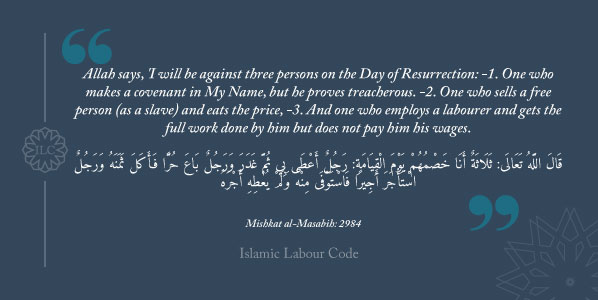
[12] Wage theft is one of the worst sins! The Prophet (ﷺ) said, “Allah says, ‘I will be against three persons on the Day of Resurrection: -1. One who makes a covenant in My Name, but he proves treacherous. -2. One who sells a free person (as a slave) and eats the price, -3. And one who employs a labourer and gets the full work done by him but does not pay him his wages.’ “. (Mishkat al-Masabih: 2984)
قَالَ اللَّهُ تَعَالَى: ثَلَاثَةٌ أَنَا خَصْمُهُمْ يَوْمَ الْقِيَامَةِ: رَجُلٌ أَعْطَى بِي ثُمَّ غَدَرَ وَرَجُلٌ بَاعَ حُرًّا فَأَكَلَ ثَمَنَهُ وَرَجُلٌ اسْتَأْجَرَ أَجِيرًا فَاسْتَوْفَى مِنْهُ وَلَمْ يُعْطِهِ أَجْرَهُ
If a worker has taken a loan and passes away before repaying it, it is the state (social security institution’s) responsibility to pay back such loan to the employer. In such cases, the amount of loan can be limited under the legislation. “A dead person in debt used to be brought to Allah’s Messenger (ﷺ) who would ask, “Has he left anything to repay his debts?” If he were informed that he had left something to cover his debts the Prophet (ﷺ) would offer the funeral prayer for him; otherwise, he would say to the Muslims present there), “Offer the funeral prayer for your friend: “but when Allah helped the Prophet (ﷺ) to gain victory (on his expeditions), he said, “I am closer to the Believers than themselves. So, if one of the Believers dies in debt, I will repay it, but if he leaves wealth, it will be for his heirs”. (Mishkat al-Masabih: 2913)
Abdullah Bin Umer (RA) said that the “Mutaffif” is the person who knowingly hires a person who gives less in measure and weight (decrease the rights of others); therefore, the sin of hiring a person on slave wages would also apply to the hiring authorities.
“Woe to those who give less in measure or weight! When (they) take by measure from others, they take (from them) full. And when they (themselves) give by measure or weigh to others, they give them less”. (83:1-3)
وَيْلٌ لِّـلْمُطَفِّفِيْنَ الَّذِيْنَ اِذَا اكْتَالُوْا عَلَي النَّاسِ يَسْتَوْفُوْنَ وَاِذَا كَالُوْہُمْ اَوْ وَّزَنُوْہُمْ يُخْسِرُوْنَۭ
“Surely, Allah commands you to render the trusts to those who are worthy of them; and when you rule over people, rule with justice (or: and when you judge matters amongst people, give judgment with justice). What excellent advice Allah gives you! Surely, Allah is All-Hearing, All-Seeing”. (04:58)
إِنَّ اللَّهَ يَأْمُرُكُمْ أَن تُؤَدُّوا الْأَمَانَاتِ إِلَىٰ أَهْلِهَا وَإِذَا حَكَمْتُم بَيْنَ النَّاسِ أَن تَحْكُمُوا بِالْعَدْلِ ۚ إِنَّ اللَّهَ نِعِمَّا يَعِظُكُم بِهِ ۗ إِنَّ اللَّهَ كَانَ سَمِيعًا بَصِيرًا
Late payment of wages, wage theft, and undue deduction from wages is not allowed. The Messenger of Allah (ﷺ) has said: This sin is enough for a man that he withholds the subsistence from one whose master he is. (Mishkat al-Masabih: 3346) Wage theft and undue deduction from wages are not allowed.
“Produce your book if you are truthful.!”. (37:157)
If a worker can prove that he was employed by the employer, he has the right to unpaid wages as well as back wages. Sa’ad b. Al-Atwal said: My brother died leaving three hundred dinars and some young children, and I wanted to use them for their maintenance, but Allah’s Messenger said to me, “Your brother is imprisoned by his debt, so pay it on his behalf”. I went and did so, and returned to tell Allah’s Messenger that I had done it and that there remained only a woman who claimed two dinars but had no proof she could show. He replied: “Give them to her, for she is speaking the truth”. (Mishkat al-Masabih: 2928)
Employers can be interrogated for non-payment of wages, or delay in payment of wages or undue deductions. As the Prophet (ﷺ) said: “أَلاَ فَكُلُّكُمْ رَاعٍ وَكُلُّكُمْ مَسْئُولٌ عَنْ رَعِيَّتِهِ”. (All of you are guardians and are responsible for your charges) (Bukhari: 2554)
In another instance, the Prophet (ﷺ) said that a person was forgiven by Allah for being kind with the debtors, especially those who were unable to pay debts. “A man who lived before your time was brought to account. Nothing good was found to be credited to him except for the fact that he used to mix socially with people and had business transactions. He was rich and he used to give instructions to his employees to write off the debts of those who were insolvent. God, the Mighty and Exalted, said: “We are better placed than him to do that. Write off whatever is recorded against him”. (Adab al Mufrad: 293)
